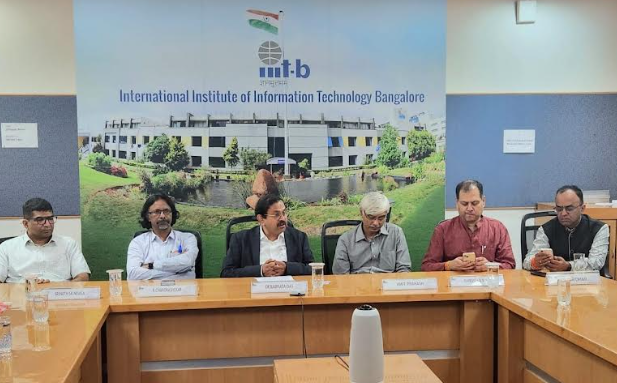Bangalore, India – July 7, 2025: The International Institute of Information Technology Bangalore (IIIT-B) has undertaken a series of major initiatives positioning the institute as a key player in the Digital Public Infrastructure (DPI) movement globally. Speaking at a press conference held during the institute’s 25th Convocation Ceremony, Director Prof. Debabrata Das unveiled IIIT-B’s expanding role in architecting inclusive, open, and scalable digital public infrastructure for the world.

Central to these efforts is the Centre for Digital Public Infrastructure (CDPI) at IIIT–Bangalore—a non-profit global team working across Asia, Africa, South America, and Europe. The Centre for DPI has engaged with over 60 countries so far, providing technology architecture advisory to governments on all aspects of DPI, with a particular focus on enabling user-centric data sharing via verifiable credentials.
Among IIIT-B’s most impactful contributions is MOSIP (Modular Open Source Identity Platform)—a secure, open-source digital ID platform developed at the institute. Adopted by 27 countries, MOSIP has enabled the issuance of over 136 million digital IDs. This platform is expected to impact the lives of more than 950 million (close to 1 Billion people) individuals in the next three years. Recognized globally for its innovation and ethical approach, MOSIP received the International Future of Government award in 2024, “Champion” award at the World Summit on the Information Society, organized by the International Telecommunication Union in 2024 in Geneva, Switzerland.
Prof. Debabrata Das, Director, IIIT-B remarked, “It is a proud moment for all of us to know that MOSIP is a homegrown R&D product from India to the world, already touching the lives of 135 million people in 27 countries. At IIIT-B, we are honoured to serve as a lighthouse institution, championing India’s expertise in open digital systems. MOSIP, OpenG2P, CDPI, and COSS lead the way in research, innovation, and translating bold ideas into scalable solutions that address Government to Public (G2P) challenges globally.”
The institute’s influence was further highlighted when Prof. Das addressed the UN Citizen’s Stack Conference in Geneva, where he presented IIIT–Bangalore’s pioneering DPI models and their potential for global adoption, especially in the Global South.
The recently established Centre for Open Societal Systems (COSS) is focused on promoting and maintaining open digital tools that support societal transformation. As an offshoot of MOSIP, the institute has developed INJI, a next-generation, privacy-centric data exchange and credentialing platform. INJI has already been adopted by 4 countries, with potential for global deployment. Prof. Das thanked eKStep, Gates Foundation, Pratiksha Trust and NORAD for their support to DPI projects.
IIIT–Bangalore Achievements and Initiatives
Beyond digital public infrastructure, IIIT-B continues to contribute meaningfully across other domains. Its E-Health Research Centre, in partnership with NIMHANS, has played a crucial role in the Government of India’s Tele-MANAS initiative, which now offers tele-mental health support through a multilingual app and video consultation platform. The service has handled over 20 Lakh calls in the past year alone, doubling its previous reach.
IIIT–Bangalore has been nominated as Lead Knowledge Institution (LKI) by NITI Aayog as part of their State Support Mission, to promote evidence-based policy interventions using data science.
Furthermore, Microsoft research, in partnership with IIIT–Bangalore, launched the AI Innovation and Inclusion Initiative (A4I). The project is based at the Centre for Accessibility in the Global South (CAGS) at IIIT-B. A4I aims to use advanced artificial intelligence to create positive and lasting impact for underserved communities around the world. With support and funding from Microsoft Philanthropies, the initiative focuses on developing and deploying large-scale Digital Public Goods that promote inclusion and sustainability.
IIITB COMET Foundation has been involved in developing a 5G-Advanced base station compliant with global telecom standards, with a focus on open radio access network paradigm to foster the growth of small and mid-sized niche players to enter an oligopolistic market. In addition, to mend coverage gaps that can arise in traditional cellular networks, with a view on the globally evolving 6G standards, COMET is developing Reconfigurable Intelligent Surfaces (RIS) that can lead to immense cost and power saving while improving connectivity.
IIIT-B has multiple ongoing projects on AI/ML on various applications and other areas of CSE, ECE, DS and Digital Humanities.
In a major infrastructure boost, the Governing Body of IIIT-B has approved Rs.817 crore to build the IIIT-B’s new east campus over the next seven years.
Moreover, the institute’s pursuit of sustainability has also earned it the International Green University Award for the third consecutive year in 2025, recognizing its commitment to environmentally conscious practices aligned with UNESCO’s Greening Education Partnership.
As nations across the world look toward building resilient digital systems, IIIT–Bangalore stands at the forefront—offering expertise, technology, and vision to create a more inclusive digital future which has deep social and economic impact.

